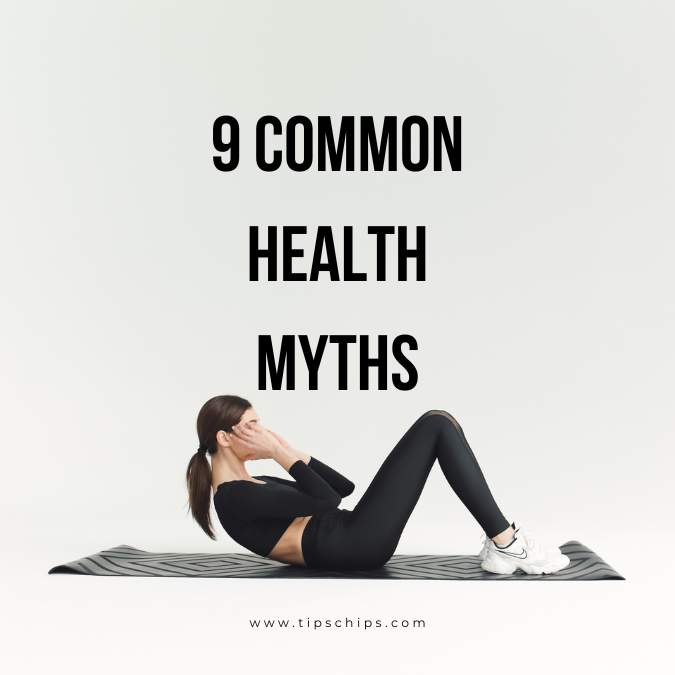9 Common Health Myths Debunked: You’ve likely heard countless health tips from friends, family, or social media. Some sound plausible, others downright strange—but many are rooted in myths rather than science. These misconceptions often stick around for generations, masquerading as “common knowledge.” 9 Common Health Myths Debunked and Replace them with facts.
Myth #1: You Must Drink 8 Glasses of Water Daily
The idea that everyone needs exactly eight glasses of water a day is oversimplified. Hydration needs vary based on activity level, climate, diet, and body size. Foods like fruits, vegetables, and coffee contribute to daily fluid intake. Listen to your body—drink when thirsty and adjust for sweat loss during exercise.
Myth #2: Eggs Raise Cholesterol and Harm Your Heart
Eggs were once vilified for their cholesterol content, but research shows dietary cholesterol has minimal impact on blood cholesterol for most people. Eggs are packed with protein, vitamins, and antioxidants. Unless you have a specific condition (like familial hypercholesterolemia), enjoying eggs in moderation is safe and nutritious.
Myth #3: Detox Diets Cleanse Your Body of Toxins
Your liver and kidneys are already expert detoxifiers. Fad detox teas, juices, or cleanses don’t “flush out toxins”—they often lack essential nutrients and may disrupt metabolism. Focus on eating whole foods, staying hydrated, and supporting your natural detox systems with fiber-rich diets.
Myth #4: All Fats Are Unhealthy
Not all fats are created equal. While trans fats and excessive saturated fats harm health, unsaturated fats (like those in avocados, nuts, and olive oil) support brain function and heart health. Avoid cutting fats entirely—they’re vital for hormone production and nutrient absorption.
Myth #5: Gluten-Free Diets Are Healthier for Everyone
Unless you have celiac disease or gluten sensitivity, going gluten-free offers no health benefits. Many gluten-free products are highly processed and lack fiber and nutrients. For non-sensitive individuals, whole grains like wheat, barley, and rye are nutritious staples.
Myth #6: Starve a Fever, Feed a Cold
This old saying is dangerously misleading. Your body needs energy (food) and hydration to fight infections, whether you have a fever or a cold. Rest, fluids, and balanced meals rich in vitamins (like zinc and vitamin C) are key to recovery.
Myth #7: You Should Stretch Before Exercising
Static stretching (holding a stretch) before a workout can reduce muscle strength and increase injury risk. Instead, warm up with dynamic movements (like leg swings or arm circles) to boost blood flow and prepare muscles for activity. Save static stretches for post-workout recovery.
Myth #8: Sugar Causes Hyperactivity in Children
The “sugar rush” myth has been debunked by multiple studies. While sugary treats aren’t healthy in excess, they don’t directly cause hyperactivity. The excitement of parties or events often explains kids’ energetic behavior, not the sugar itself.
Myth #9: Low-Fat Foods Are Always Healthier
Low-fat products often add sugar, salt, or artificial additives to compensate for flavor. For example, low-fat yogurt may contain more sugar than full-fat versions. Prioritize whole, minimally processed foods over “low-fat” labels.
Conclusion
Health myths persist because they’re simple, catchy, or tied to tradition—but blindly following them can harm your well-being. Always question claims that lack scientific backing and consult reputable sources or healthcare professionals. Cultivate a habit of critical thinking: if a tip sounds too good (or too odd) to be true, it probably is.
What health myths surprised you the most? Share your thoughts below—and let’s keep the conversation science-based!
